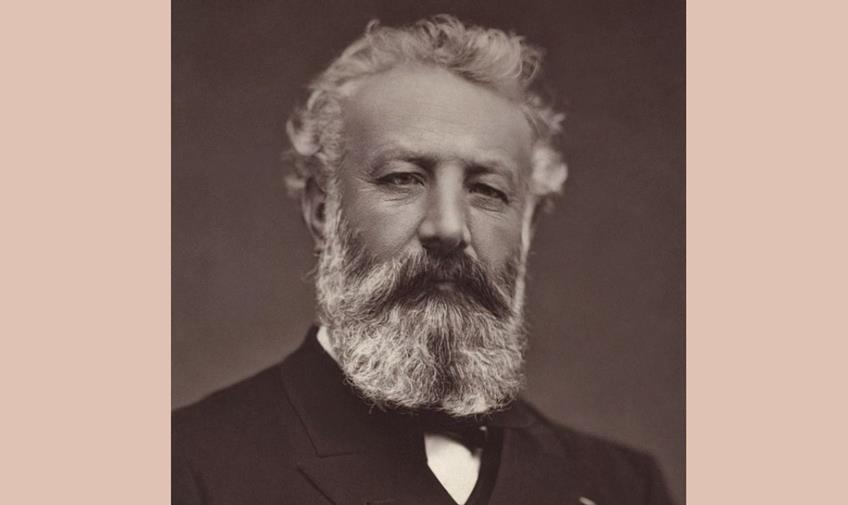In the late 19th century, adventure and science fiction writer Jules Verne repeatedly praised Americans’ ingenuity, inventiveness, and strong work ethic. Both in the crafting of his characters and his descriptions of Americans generally, the French author exhibited a remarkable appreciation for this people’s attitudes and contributions to the world, sometimes to extremes.
Take, for instance, From the Earth to the Moon, the premise of which is that a group of ex-Civil War ballistics experts, The Gun Club, having grown bored in peacetime, propose to build a cannon so large and powerful as to send a projectile to the moon. The entire world is taken up with the Americans’ ambitious proposal, and donations pour in from around the globe.
Verne’s eloquent musings on the transcontinental railroad in Around the World in 80 Days strongly endorse this same American work ethic, showing the energy and rapidity with which the rails were laid. It is these traits, making 19th century Americans such excellent heroes of these stories, which have faded out of the national profile as of late. If Verne were writing today, he would likely look beyond our shores for his heroes, and doubtless would have fewer kind words to say about contemporary American’s attitudes and aptitudes.
Consider the change we have undergone. In 1846, Royal Earl House invented the printing telegraph. In the 1860s, two private companies built North America’s first transcontinental railroad which Verne speaks of as mentioned above. In 1879 Thomas Edison invented the electric light bulb. In 1903 Orville and Wilbur Wright invented the airplane.
In 2020 the American government forced businesses to shutter their doors, and people to stay home locked behind their own. And the American people accepted this. The solution to government-caused mass unemployment was for the government to freeze evictions and send out checks for everything from “stimulus” to additional unemployment benefits. Now in 2021, with many Americans vaccinated, businesses reopened, and life going on pretty much as normal (the old normal, not Dr. Fauci’s “new normal”), Americans still cling to the government as provider and protector while taking the words of so called “experts” as gospel and deferring much of life’s largest decisions to these bureaucrats.
What a switch from the world Jules Verne knew. In From the Earth to the Moon, Frenchman Michel Arden lands on American shores, proposing to take up residence inside a specially crafted shell and so make the journey to the moon in person. Arden, in a speech to some 300,000 persons interested in the success of the project, lauds Jupiter for not having a tilted axis.
This, Arden supposes, allows the “Jovians” to select from regions of their planet each existing in perpetual states of a given season, a deficit of which he considers a serious flaw of Earth. Arden remarks that if only we could rectify the Earth’s axis, we too could enjoy such locked climate conditions, a proposal taken up at once with cheers by the Americans he is addressing.
And, in all probability, if the truth must be told, if the Yankees could only have found the point of application for it, they would have constructed a lever capable of raising the earth and rectifying its axis. It was just this deficiency which baffled these daring mechanicians.
Contemporary Americans would not jump at the chance to rectify the Earth’s axis, nor, it has been shown, even dare to go outside their own homes without government permission. With government checks still flowing out to workers who were laid off during the pandemic, there are perverse incentives to studiously avoid the diligent hard work that made Americans perfect heroes for Verne’s novels.
Indeed, as our economy has grown more and more specialized, so have we as people. Skills that were once commonplace, such as changing a tire, no longer register as important or useful, at least until a moment of need when it’s a bit late to acquire such knowledge.
When Jules Verne was writing, much of America was a vast expanse of untamed wilderness. Knowing how to hunt and clean an animal, which berries to eat, or how to construct a shelter were necessary skills in the days when even the civilized areas of America were far more rural and sparsely populated than they are today. Europe in Verne’s time was still the Old World, for the most part urbanized, civilized, and decidedly domesticated.
Now America is also urbanized and domesticated. This has left us writers, accountants, and social media managers all too ready and able to rely on the folks who still maintain more practical skills to provide us with our basic necessities of life.
As such, one highly doubts that any randomly selected group of five contemporary American castaways should fare so well as did Cyrus Smith, Neb, Bonadventure Pencroft, Harbert Brown, and Gideon Spilett in The Mysterious Island. Certainly there is no chance that the contemporary Americanswould be able to build telegraph lines!
No, it is far more likely they would simply waste away from lack of effort and knowledge, perhaps while looking longingly at the coconut trees and wondering why some friendly government agent didn’t come along and harvest the fruit for them. After all, coconut harvesting was not part of the liberal education requirements at their colleges!
The 19th century and the first half of the 20th century were years of American heroes. Pioneers, explorers, soldiers, and inventors dominated the American consciousness, and nearly every man, woman, and child was close enough to the basics of life as to at least partially understand them. Now in the 21st century we venerate bureaucrats, athletes in controlled sports, and technologists who never stray too far from the comfort of their air-conditioned desks.
These careers may make for good business, but they make for lousy heroes.
Image Credit:
Wikimedia Commons-Gallica Digital Library, Étienne Carjat, public domain

Leave a Reply